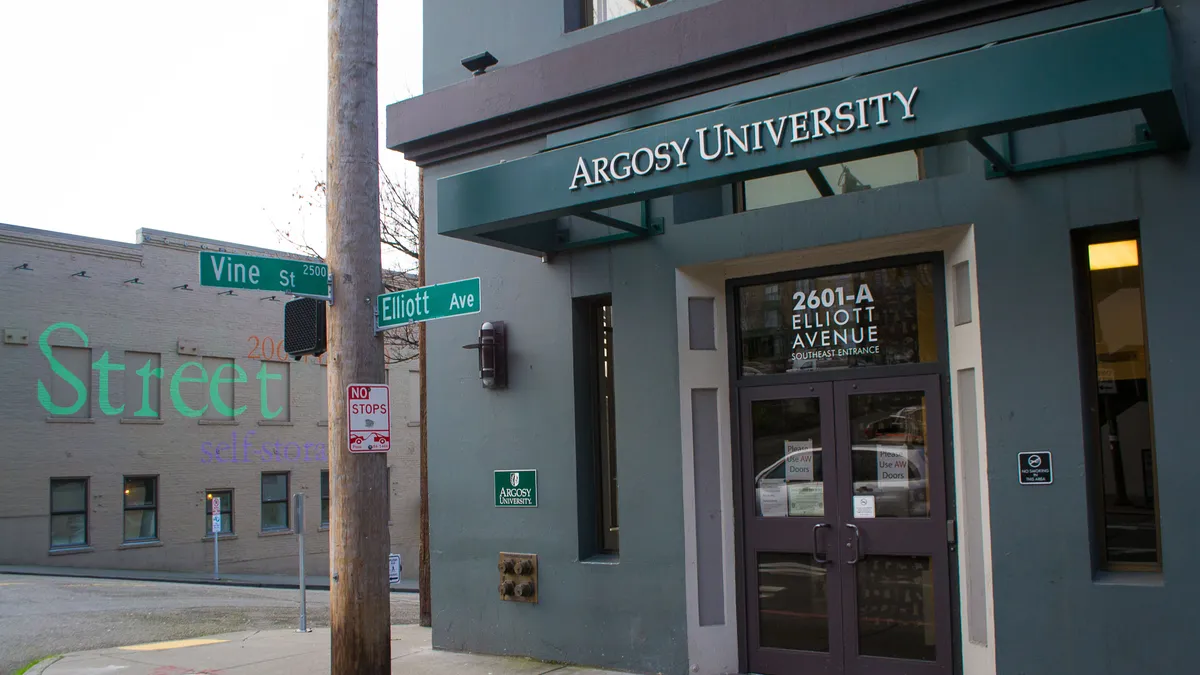Dive Brief:
- Ten attorneys general recently reached a settlement to cancel student debt incurred by those who attended Argosy University, a collapsed for-profit chain, before the institution abruptly closed in 2019.
- The agreement was reached with the current owners of student debt that Argosy's students borrowed from the university. It will be filed in a federal receivership court, according to an announcement. Overall, the deal cancels almost $2.1 million in student loans that Argosy directly issued to students across a dozen campuses.
- The attorneys general alleged that Argosy falsely marketed itself as a nonprofit institution and provided misleading information to students that prevented them from making sound financial decisions.
Dive Insight:
The agreement is the latest development in a nonprofit organization's failed bid to buy and run a chain of for-profit institutions and turn them into nonprofits.
The series of events leading to Argosy's closure highlighted several major issues in higher ed that the Biden administration is hoping to tackle by tightening regulations around for-profit universities. Those forthcoming rules are expected to address loan discharges when colleges close, which can leave students scrambling to figure out what's next. U.S. Department of Education officials are also more closely examining deals meant to change for-profit universities to nonprofits under new owners.
In 2017, the faith-based nonprofit Dream Center Foundation took its first steps in the higher education world when it acquired the Art Institutes and Argosy University from Education Management Corp., which had shortly before been accused of violating consumer protection laws.
At the time, the Ed Department tentatively approved the sale but did not formally approve the institutions' transition to nonprofit status. The agency said it would have to comprehensively review the Dream Center's capabilities before it would fully green-light the sale and conversion.
However, Argosy's finances suffered under the Dream Center's ownership, with the organization facing insolvency only one year later. In February 2019, the Ed Department revoked Argosy's eligibility for federal financial aid over its poor finances and denied the change in ownership. The university abruptly closed campuses a month later. Although the Dream Center successfully sold some Art Institute campuses, several shut down.
The attorneys general accused Argosy and its owner of making a series of misrepresentations to students. For instance, Argosy's website stated that the university was a "nonprofit academic institution" even though the conversion hadn't yet been approved.
The agreement also says the Dream Center announced campus closures over email in July 2018 but did not provide the dates of those closures or information about students' options. Later that month, the Dream Center distributed guidance to campus presidents about students' options, but those communications didn't initially include clear information about their ability to request closed school loan discharges, according to the agreement.
"Students of Argosy University, through no fault of their own, have been left with debt and even negative credit ratings — but not the degrees they were promised," Illinois Attorney General Kwame Raoul said in a statement. "I am pleased with this agreement that provides some relief to those students and holds Argosy accountable to the students abandoned when the school abruptly closed."
Attorneys general from Arizona, Colorado, Florida, Georgia, Hawaii, Minnesota, Tennessee, Utah and Virginia were also part of the settlement.















